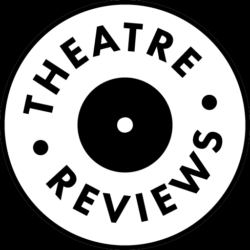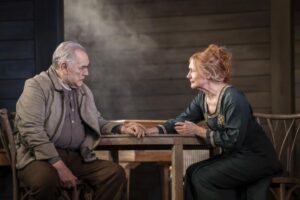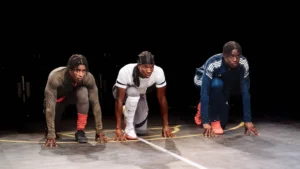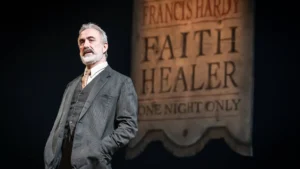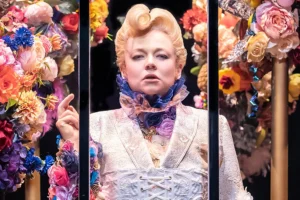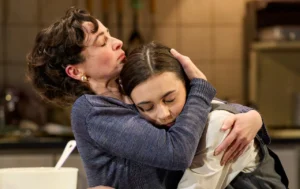National Theatre
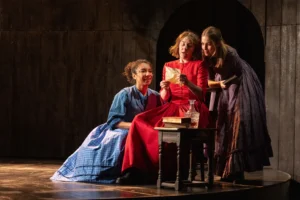
The Brontë sisters are re-examined in Sarah Gordon’s comedy Underdog: The Other Other Brontë, which won the Nick Darke Award in 2020 and is now given an outing at the National’s small Dorfman Theatre. Most critics occupied the middle ground, finding it funny but shallow, but the i gave it a rare 5 stars while The Stage could only find a curmudgeonly two. Gemma Whelan from Game of Thrones and Upstart Crow stands out as Charlotte in a story of sibling rivalry also featuring Rhiannon Clements as put-upon Anne, and Adele James as marginalised Emily.
[Links to full reviews are included but a number are behind paywalls and therefore may not be accessible]
Let’s start with Fiona Mountford in inews (5★). Describing it as ‘ebullient’, she said it was ‘as joyously invigorating as a brisk walk over the Yorkshire Moors’. She liked the ‘robustly 21st-century critique of sisterhood, ambition, reputation and gatekeeping’ and said, ‘Whelan is in her element as the uncompromising Charlotte, witty, selfish and magnificent with it.’
Neil Norman in the Mail (4★) liked the sisters: ‘Arresting performances from Whelan as the deeply unsympathetic Charlotte, Clements as the independent-but-withdrawn Anne and James as the stoical Emily keep Gordon’s spirited play alight.’
And so to the three star reviews. Here’s Arifa Akbar in The Guardian (3★): ‘Directed with pace by Natalie Ibu…Gordon’s script bounces along, albeit with some glaring modern-day lessons on masculinity and inequality tacked on. It is quick-witted and amusing’, then comes the iron fist in the velvet glove, ‘though it never deepens enough for the emotional punches to land.’ She praised the look of it: ‘the exposure of envy and competition beneath the Brontës’ sisterliness is mirrored in the visual metaphor of Grace Smart’s set which consists of a verdant floral mound uprooted at the start to reveal dark matter beneath.’
Dominic Cavendish in the Telegraph (3★) talked of a ‘canny, but in my view overly perky, portrait of the siblings’. He expanded, ‘It’s as if in fearing to make the past dull, it must be brought alive in primary colours. In avoiding the clichés of the Gothic…she errs towards the goonish.’ His final comment suggested he was judging the show by the standard of an imaginary play in which ‘the novels, in all their richness, … speak for themselves.’ On the plus side: ‘It’s very stylishly designed by Grace Smart, pacily staged by Natalie Ibu, and winningly played across the board.’
For Sarah Crompton at Whats On Stage (3★), ‘Natalie Ibu’s direction (is) confident and fleet…Whelan…is commanding as she turns Charlotte into a monster…Adele James brings deep emotion to the under-written part of Emily, author of Wuthering Height.’ However, she seems to be having the same thought as the Telegraph critic: ‘what goes missing amidst the humour and the sisterly squabbling, is the sense that the Brontës did actually deserve their place in the literary canon.’Nick Curtis used plenty of complimentary adjectives in his review in the Standard (3★)- ‘rumbunctious’ ‘playful and visually witty’ but he also damned it as ‘slender’.
Heather Neill at The Arts Desk (3★)felt ‘Natalie Ibu’s speedy direction fits the light-hearted, often caricatured storytelling, the audience always knowingly acknowledged…Whelan is a fire-cracker, rarely still, very funny.’
Clive Davis in The Times (3★) described it as ‘hyperactive burlesque’, and ‘a short story posing as a novel.’ In compensation, he found ‘Gemma Whelan’s salty performance always holds your attention’ and he appreciated ‘All the salty language, not to mention the unashamedly anachronistic jokes’.
Andrzej Lukowski in Time Out (3★) also liked Gordon’s script and Gemma Whelan’s performance: ‘(the) dialogue is blunt, funny and wilfully anachronistic..the supremely watchable Whelan devours her part whole’. Although he liked ‘Natalie Ibu‘s larky, visually inventive production’ and thought ‘Underdog is a very funny play,’ he felt, ‘That funniness doesn’t always work to its advantage. It has nuanced points about authorship, legacy and family that are obscured by the sound of laughter.’
Lucy Kenningham at CityAM (3★) took it quite personally. Having told us she has a sister, she ended her review: ‘Short and ambitious, it hurls ideas into the Yorkshire air, many of which land flat. But examinations of sisterhood are depressingly rare, so when those ideas are explored, they hit hard.’ (She clearly missed Till The Stars Come Down, The House of Bernarda Alba and Dancing At Lughnasa, all recently at the National, and all exploring sisterly relationships.)
While Sam Marlowe in The Stage (2★) made many of the same points as her fellow critics, she was less forgiving. She referred to it as being ‘reductive to the point of becoming glib and cartoonish’. ‘There’s nothing deeply felt and scant sense of character, in a play more invested in winning easy laughs,’ she said. ‘The actors are game and hard-working, and at best it’s mildly entertaining. But as an exploration of women who left us such sinewy, sexy, courageous writing, it feels like a sadly wasted opportunity.’
The Observer’s Susannah Clapp (2★) had little time for the show: ‘where in this mechanical modernisation is the imaginative power that makes the sisters worth attending to?’ although she did concede: ‘Natalie Ibu’s strenuously comic production gets lively perfs from Rhiannon Clements as Anne…Adele James as vibrant Emily, and Gemma Whelan as domineering Charlotte.’
Underdog can be seen at the National Theatre until 25 May 2024. Buy tickets direct from nationaltheatre.org.uk
Average Critic Rating 3.1★
Value Rating 48 (Value rating is the Average Critic Rating moderated by the typical ticket price. In theory, this means the higher the score the better value but, because of price variations, a West End show could be excellent value if it scores above 30 while an off-West End show may need to score above 60. This rating is based on opening night prices- theatres may raise or lower prices during the run.)
Read Paul Seven Lewis’s review of Underdog
If you’ve seen Underdog, please add your review and rating below

